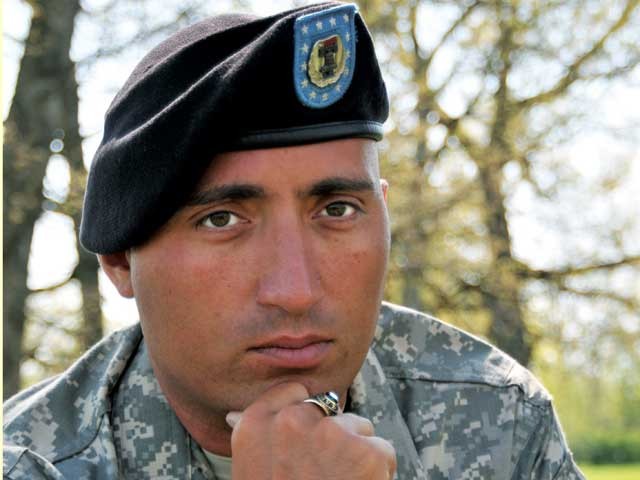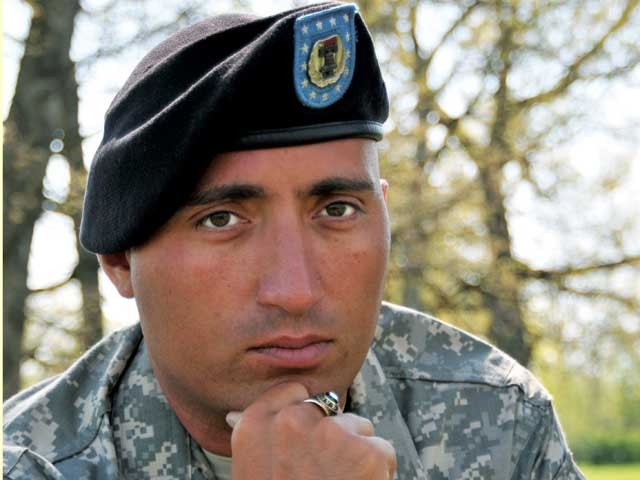He was waiting for me near the main entrance of the U.S. Army Recruiting (USAREC) Headquarters building, looking at displays of recruiting awards. A field artillery noncommissioned officer with nine years in the Army, eight in the Army Reserve and two deployments to Iraq, Staff Sgt. Jose Reisinger is considered an above average recruiter - having earned his gold badge, recruiter ring and a promotion during his three years in USAREC.
As I walked up to him, he looked like any other Soldier in the building - standing tall with an aura of strength and pride. As he turned to shake my hand, I was met with warm eyes and a charming smile. He had a self-confidence and easiness about him that I expected from someone who's been on recruiting duty for a few years.
Six months ago, however, he painted an entirely different picture.
One day Reisinger would be over the top happy and other days he showed up to the recruiting station like a walking zombie, according to Sgt. 1st Class Christopher Lockwood, his station commander at Eagle Ridge recruiting station in Lake Wales, Fla. Because of Reisinger's past recruiting performance, Lockwood said he initially was not overly concerned.
"Everybody goes through those times when it gets rough and I just figured it was one of those times," Lockwood said.
Reisinger wasn't initially exhibiting signs of stress or trouble coping while he was at the office, according to Lockwood. Despite being successful, Reisinger said he feels that recruiting is not for everyone - and it definitely was not right for him.
"In a way I had gotten into my own world in combat arms - in field artillery; it's something that I love. I like the Army and the Soldier world. I was used to that," said Reisinger, who, when selected, took the advice of some fellow Soldiers and extended for three years to complete the tour on recruiting duty. The Soldier skills used on deployments are like instinct, he said, what he had been training on for nine years.
"When I got to recruiting, and the mental stress in recruiting rather than physical, it just broke me; it really did. It's a whole different kind of stress - I wasn't ready for that. A lot of it was stress I put on myself to be good and to achieve what they wanted from me."
It was an added challenge - and stress - to be outside of the "Soldier world" living in the civilian community with the pressure of representing the Army 24/7, as well as being a single Soldier in a station of mostly married Soldiers.
"Talking to these kids and people in the community, for whatever reason, was terrifying and mentally stressful for me."
Reisinger said that he began struggling just a few months into his recruiting tour. With the stress came the bad dreams and flashbacks of his deployments. Alcohol became his means of coping early on, but he was able to keep it mostly hidden - until he hit a sort of a "dry spell" after the end of the fiscal year.
"From a combat arms point of view - failure was not an option. That just added to the stress. I was doing what was asked of me - making the contacts - but I just wasn't finding anyone."
His drinking became progressively worse - from weekends to every night of the week, and eventually he said he felt like he needed it to function every minute of the day.
"I was blinded by it. I didn't think it affected me; I actually thought it kind of helped me when I was out talking to people," said Reisinger, who said much of those months are cloudy in his memory.
When Reisinger's drinking, mood swings and outbursts began to affect the work environment, assistant station commander Sgt. 1st Class Steven Alfaro said he realized he had to take action and alert the company leadership. He said the other recruiters were becoming very annoyed with Reisinger's unpredictable and sometimes aggressive behavior.
Because this was the first time Reisinger had gotten into trouble, the company commander opted to recommend Reisinger for outpatient treatment instead of disciplinary action, and then took him off mission for a period of time after he returned to the station.
It wasn't enough; he still wasn't able to cope. "I knew I had something wrong, but I didn't know what to do for myself to get the assistance I needed," said Reisinger, who was struggling with personal relationship issues, as well as the recruiting challenges.
Reisinger said he doesn't know what kept him from taking his own life.
"I didn't feel like it was worth it anymore. There was no getting out of it; no escape. I knew I was in danger. But the fear of being perceived as weak, the fear of being possible reprimanded or punished. I pretty much had to be tackled and taken in."
The fear of being possibly reprimanded or punished became very real one morning in mid-January during a visit by the company commander and first sergeant. Reisinger had a blood alcohol level well above the legal limit and had brought a flask to work.
"He was real concerned about how he was going to be viewed - that our opinion would be less of him. We made sure and confirmed through our actions that what we said was real," said Lakeland Company 1st Sgt. Tony Conyers. "It was an entire team effort to make this happen."
By his whole team coming forward, Company Commander Maj. David Wilson said they were better able to help Reisinger. "I knew he was a good Soldier - his behavior was not like it had been just a few months ago. I wanted to know why," said Wilson, who got on the phone with Reisinger to call Military OneSource to ensure they understood the severity of the problem and got him the help he needed. "I wanted to know what was going on below the surface - beyond the drinking - and help him get to the root of his problems."
Lockwood admitted that he's not certain his fellow recruiters all understand what Reisinger's going through, with the alcohol abuse and addiction to the medication he had been taking since March 2008 for depression, anxiety and post traumatic stress disorder.
"I don't think they understand the daily struggle with that, so there is some jealousy about the work schedule he has now to keep up with his medical appointments and treatment schedule," Lockwood said.
It means a lot to Reisinger that his leadership is allowing him to get the help he needs. He said he truly appreciates that the company commander and first sergeant kept his situation completely confidential.
"You wouldn't have even known it was happening to him. I made it clear to the team he was part of the team, but that some personal business doesn't have to be shared," said Conyers, adding that it makes things easier for the Soldier to recover.
He and the commander kept it on a need-to-know basis. They let Reisinger tell his fellow NCOs - outside of those in his station - about what he went through when he was ready.
"It could have easily been one of us," said Wilson, who believes they saved Reisinger's life. "You have to think about how you would want to be treated.
"You really do have to know and understand your Soldiers. Ensure your Soldiers believe in what you say and they will really feel confident and coming forward and saying, 'Hey, I need some help,'" Wilson said. "It's not all about recruiting, and it's not all about the numbers. It's about taking care of people."
Reisinger agrees. He said he believes strongly that he'd be dead right now if they hadn't stepped in. Instead, he just reenlisted for six years and is heading to Fort Drum - and potentially another deployment, which he said he is looking forward to.
He said his experiences on recruiting duty have made him a better leader and able to help his Soldiers in the future, especially those on their first deployment. Reisinger urges first-line leaders to pay a little bit more attention to their Soldiers, to "see a little deeper than what they are achieving; see what's behind the gold badge.
"I would never be the one you'd expect, because I have achieved. I know there are others like me out there, possibly worse, and just because they've earned their ring or medallion doesn't mean they're not going to jump off a bridge."
That Soldier might show up on time every day, look sharp in his uniform, flash a charming smile and make the mission, but underneath is working so hard to keep up that faAfASade, he said.
"I made it look so good that no one thought I had an issue when I went home every night. I just want to be able to keep others from going through what I have. If I can help just one Soldier, it's worth it."


Social Sharing